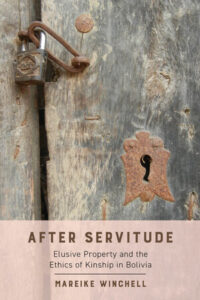By Mareike Winchell, author of After Servitude: Elusive Property and the Ethics of Kinship in Bolivia
In 2010, I was just beginning an ethnographic study of Quechua water activists in Cochabamba. At the cusp of starting my doctoral fieldwork, I had a conversation with an activist friend in Bolivia who I had known for several years. I was telling him how interlocutors in the city kept pointing me to the same institutions and their directors, including Cochabamba’s Democracy Center, headed by Berkeley-educated Jim Shultz, which had been founded in San Francisco in 1992. My friend was reproving: “All you Northern social scientists come here to study the same thing (that is, the Water Wars of 1999 and 2000), you talk to the same people at the same institutions, and you leave and write the same thing.”
His comment struck me. How could I tell a different story in a political moment that appeared overly uniform, and where researchers’ own commitments were so closely echoed in those of their interlocutors that they forgot that those normative commitments might not be absolute?
And so, this book tells another story. After Servitude: Elusive Property and the Ethics of Kinship in Bolivia draws from two years of my fieldwork in the rural Bolivian province of Ayopaya to focus on ethical disagreements about how to remedy violent labor pasts. In Bolivia—a nation best known in the United States for the mass mobilizations that swept across the country and led to the election of Latin America’s “first Indigenous president” Evo Morales in 2005—it is tempting to view racial hierarchies as anachronistic, colonial inheritances that should have already been uprooted. This was how government officials saw the region, which had long been identified with the tragic subjection of Quechua laborers who would require aggressive programs of state aid in order to become free. My book demonstrates the risks of such a conceptual move, namely how it has limited scholarly attention to the active ways that Indigenous peoples inhabit and recast racial hierarchies to demand answerability for past violence.
More precisely, I examine the range of ways that Bolivians sought to address a divisive past related to earlier hacienda servitude, including through practices of informal land gifting, adoption, and the exchange of money, food, medicine, school supplies and money from the families of former hacienda masters to servants. I name this condition life “after servitude”—after meaning sequential ordering, pursuit, a continual following, in the style or imitation of, and in accordance with the nature or desires of another thing. After-ness conveys a beholden-ness to the past, not a break from it. Through such relations among people and to spirits, more-than-humans, and land as a site of temporal overlay, Ayopayans engaged history less as a series of epochs to be overcome, and more as a collection of cross-cutting and interwoven threads that could be cultivated to transform the present.
Unlike so many other studies on Bolivia, my book enters the country’s political moment from the underbelly: from the position of rural subjects who have not experienced the self-evident benefits of “modern citizenship.” How to sit with the pessimism of those people who, rather than finding liberation or a new ground of citizenship, instead find themselves re-marginalized, even animalized, by a narrative of national anti-colonial struggle for whom they act as scapegoats? To find the answer, I spent much time sitting on the ground in pastures, outside sheep sheds, in earthen patios with corn husks drying, and learning about the nation’s labor past and contemporary political landscape. I opened myself up to pondering the significance of practices that, from my own ethical and political background, appeared deeply troubling, offensive, and even grotesque.
I did this not to simply enact the classic relativistic move—”We” here in ‘the West’ think this, but “They” there instead do this”—but rather to elevate that grounded experience and insight as a basis from which to make, and remake, existing theories of the political. What happens to our understanding of the machinations of rights-based repair when we take as foundational, not exceptional, experiences like those of aging Quechua servants? Doing so allows new kinds of injuries to come into view. More precisely, the book shows how institutional programs of land-based reparation can act as catalysts for guilty parties to escape or refute their own culpability for violence. These programs can also reinstall gender and racial hierarchies that reproduce the forms of blameworthiness that organized earlier labor servitude.
After Servitude is a provocation to sit with forms of political practice and ethical sensibility that I did not share with interlocutors, and that indeed chafe up against rights-based paradigms of freedom premised on the discrete nature of past and present. Along the way, I rethink what history is, for whom it operates, and to what ends. Doing so illuminates the cracks in masculinist fantasies of unencumbered agency that see dependencies principally as constraints. Instead, Quechua communities in Ayopaya sought to extend kinship relations to mestizo elites in order to make new demands of the present. With this practice, they also pushed back on dominant models of citizenship that create as shadowy doubles the figure of Black(ened) humanity, forms of human-ness seen as more proximate to beasts or animals. Instead, After Servitude draws into focus practices of historical reparation based on an insistence that racial elites engage directly with injured parties. This sheds new light on the ways dispossessed groups re-deploy oppressive pasts to make claims, to demand accountability, and to contest the closures of rights-based paradigms of justice.

